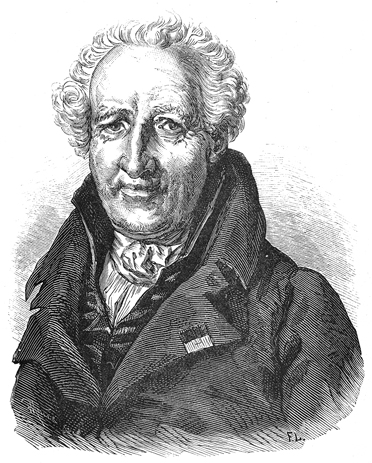<Back to Index>
- Botanist Antoine Laurent de Jussieu, 1748
- Painter and Sculptor Constantin Meunier, 1831
- Prime Minister of Greece Ioannis Metaxas, 1871
PAGE SPONSOR

Antoine Laurent de Jussieu (12 April 1748 – 17 September 1836) was a French botanist, notable as the first to propose a natural classification of flowering plants; much of his system remains in use today.
Jussieu was born in Lyon, the nephew of the botanist Bernard de Jussieu. He went to Paris to study medicine, graduating in 1770. He was professor of botany at the Jardin des Plantes from 1770 to 1826. His son Adrien-Henri also became a botanist.
In his study of flowering plants, Genera plantarum (1789), Jussieu adopted a methodology based on the use of multiple characters to define groups, an idea derived from Scottish-French naturalist Michel Adanson. This was a significant improvement over the original system of Linnaeus, who classified plants into classes and orders based on the number of stamens and pistils. Jussieu did keep Linnaeus' binomial nomenclature, resulting in a work that was far-reaching in its impact; many of the present-day plant families are still attributed to Jussieu. Morton's 1981 History of botanical science counts 76 of Jussieu's families conserved in the ICBN, versus just 11 for Linnaeus, for instance. Writing of the natural system, Sydney Howard Vines remarked
"The glory of this crowning achievement belongs to Jussieu: he was the capable man who appeared precisely at the psychological moment, and it is the men that so appear who have made, and will continue to make, all the great generalisations of science."
In 1788, he was elected a foreign member of the Royal Swedish Academy of Sciences. He was a member of the Masonic Lodge, Les Neuf Sœurs.